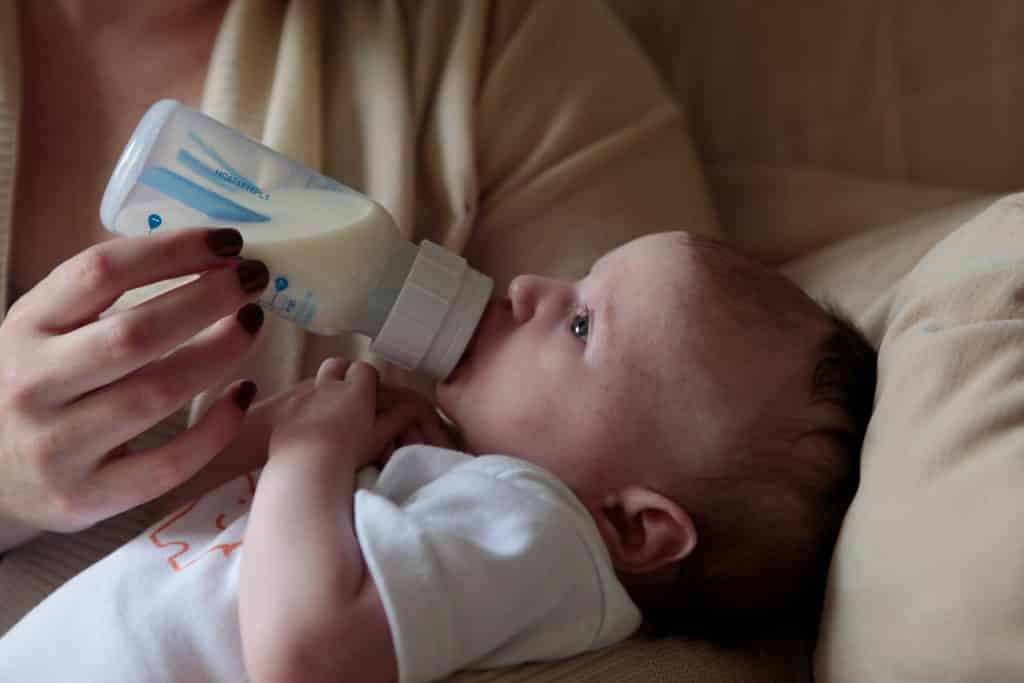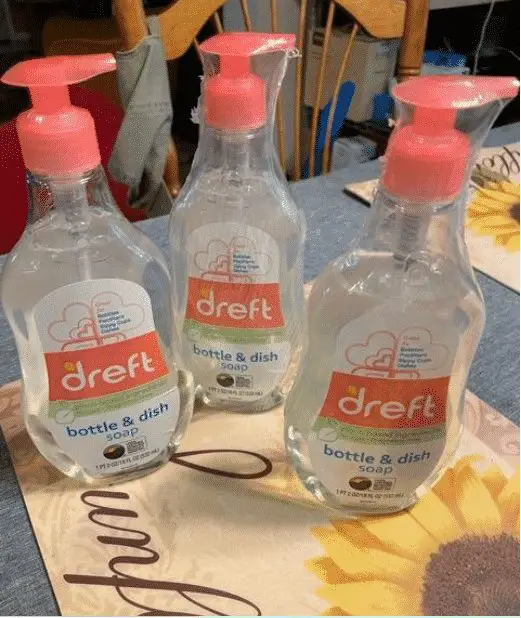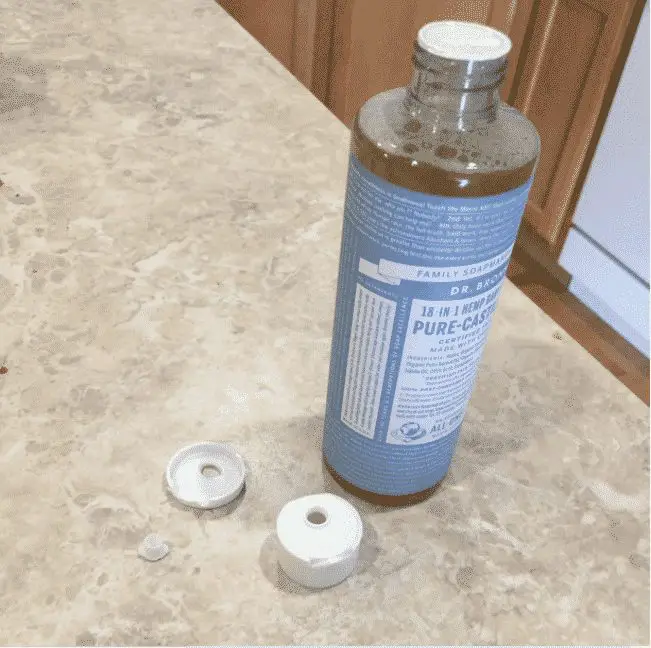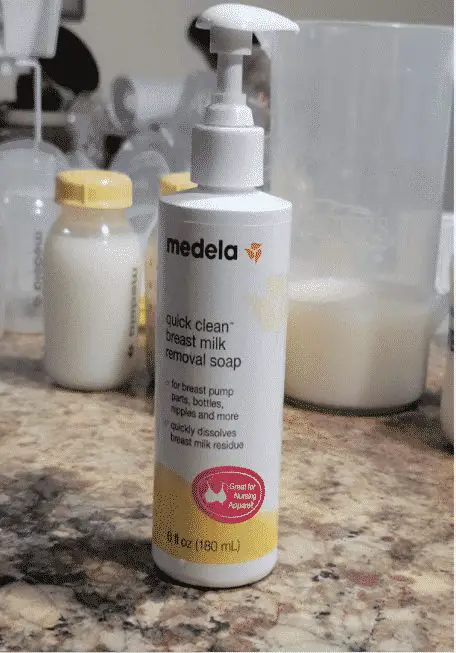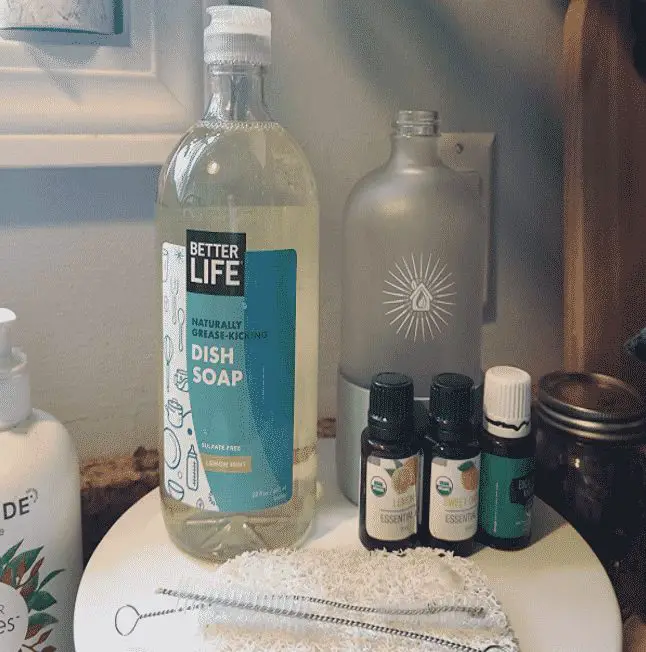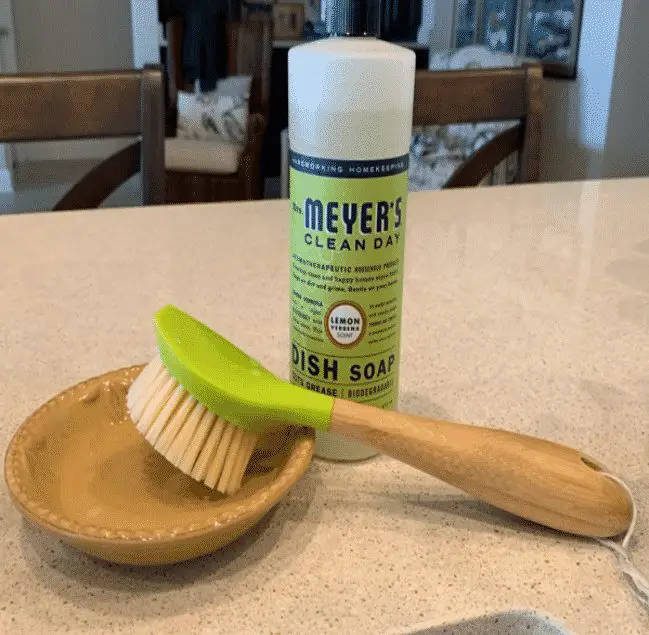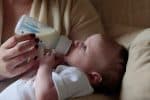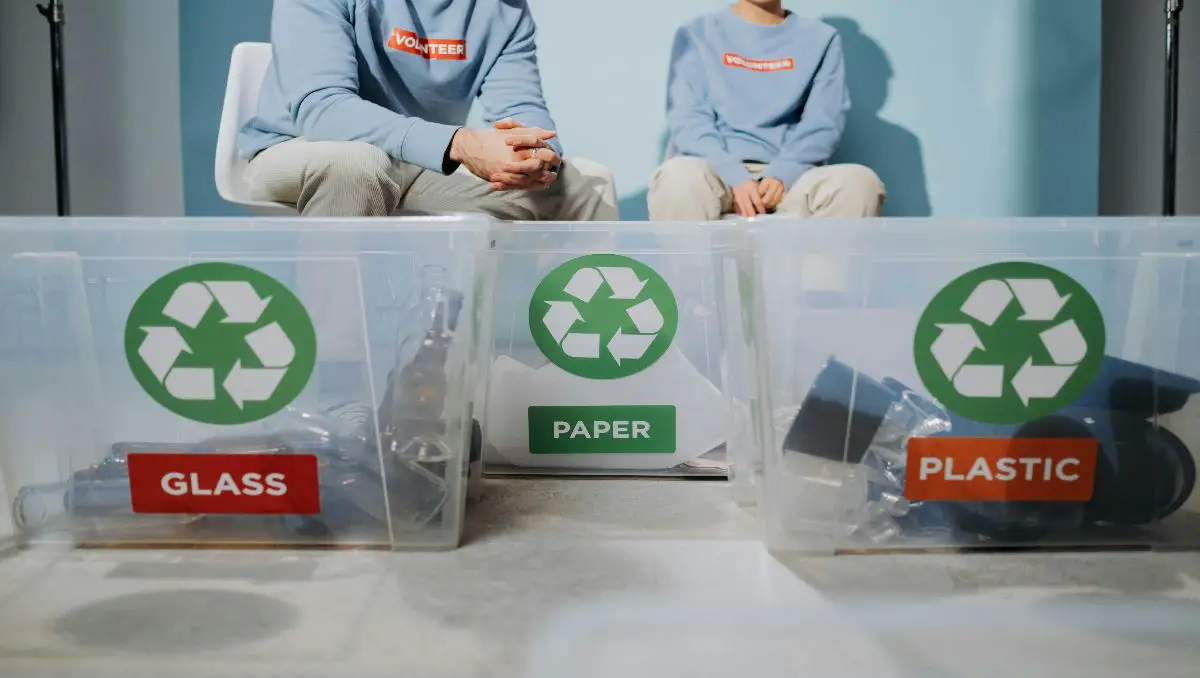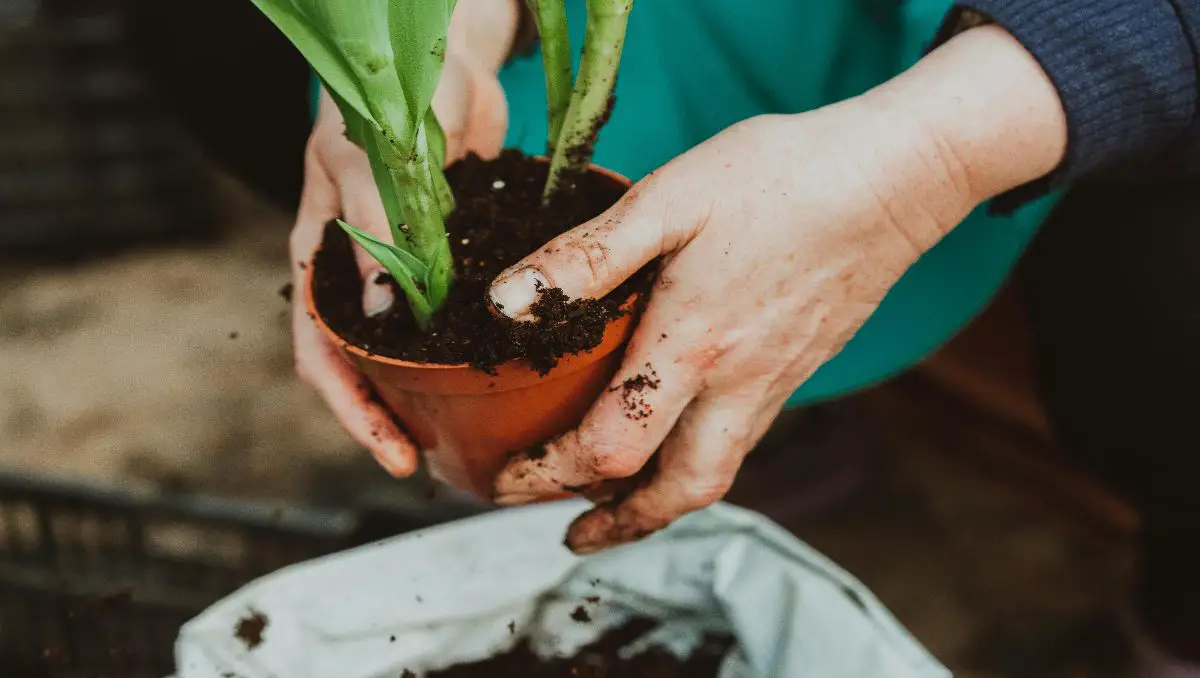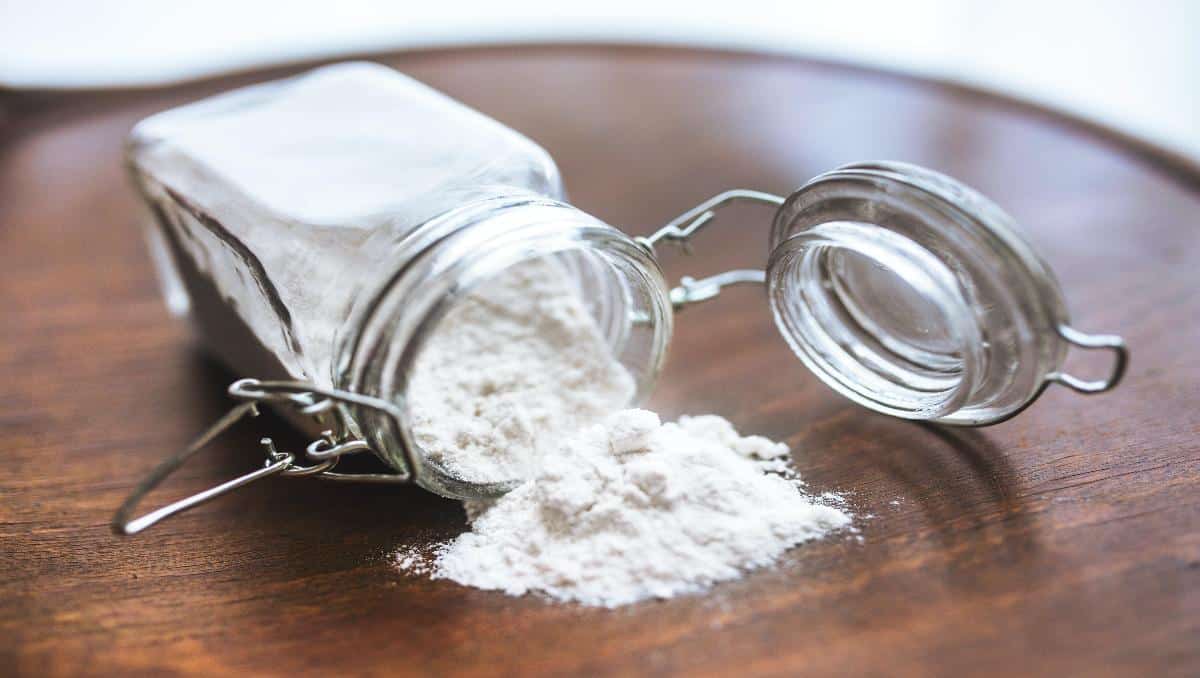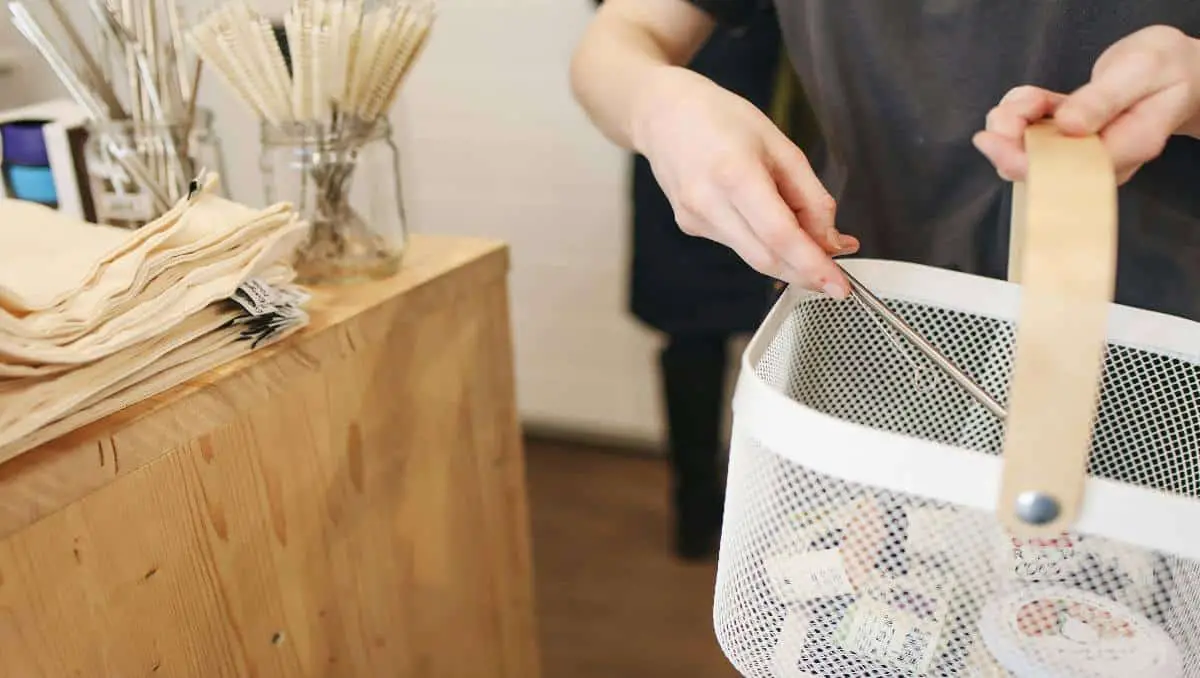In parenting, your top priority is keeping your children healthy and safe. This means making sure their feeding tools, like their baby bottles, are clean. For their general well-being, it’s crucial to think about both how and what you use to clean them.
Key Takeaways
- Avoid harsh chemicals such as SLS, SLES, parabens, and artificial fragrances.
- Opt for biodegradable, phosphate-free soaps that use plant-based ingredients.
- Brands such as Babyganics, Dr. Bronner’s, and Elysium Eco World stand out for their eco-friendly and effective cleaning formulas.
- Studies have shown that certain dish soap ingredients can alter gut microbiomes, linking to health issues.
- Making your natural dish soap with castile soap and vinegar can be cost-effective and eco-friendly.
This comprehensive guide shares the essentials of choosing the best dish soap for baby bottles, highlighting key factors and offering recommendations to make your parenting journey a tad easier.
Why Choosing the Right Dish Soap Matters
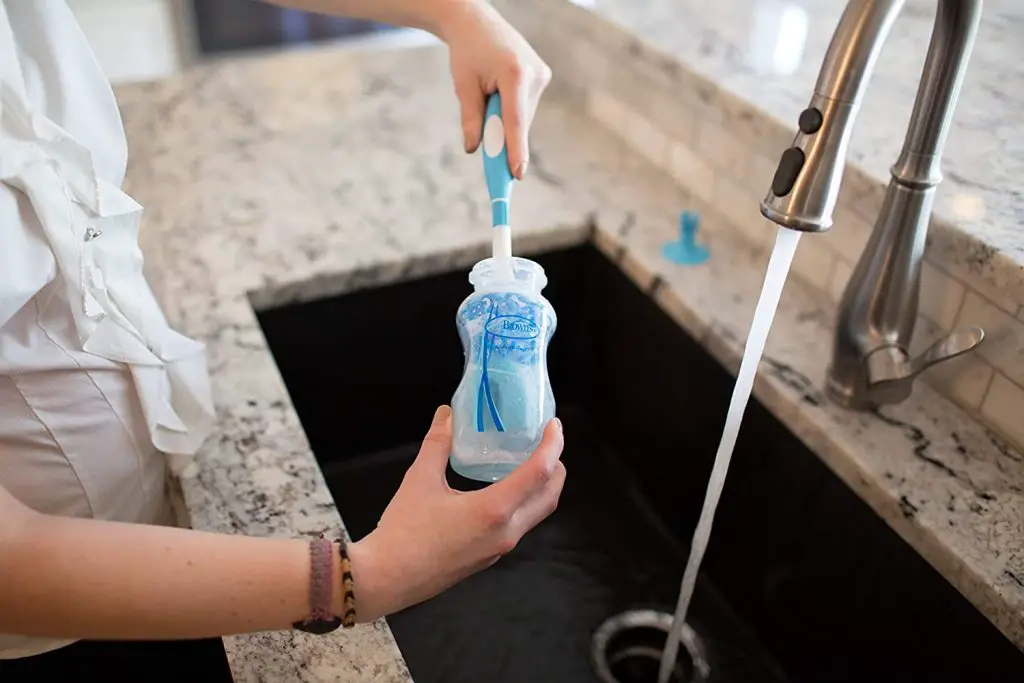
While it might seem like any old dish soap would work for cleaning baby bottles, the reality is that many conventional dish soaps contain ingredients that can be harmful to your little one.
A 2019 study has revealed that dishwashing liquid might be more harmful to gut health than what researchers previously thought. Some soap ingredients, like triclosan, which battles bacteria and fungus, can disrupt the balance of beneficial microorganisms in the digestive system.
University of Chicago scientists discovered that triclosan alters gut bacteria in fish. Removing triclosan can reverse these changes, yet studies suggest some effects on bacterial communities may be permanent.
These shifts in gut bacteria are significant because they’re connected to various health problems, such as obesity, inflammatory bowel disease, and even changes in behavior and metabolism. These effects are especially harmful to unborn babies and newborns.
Here are other reasons why choosing the right dish soap specifically formulated for babies is crucial:
Harsh Chemicals
Many conventional dish soaps have chemicals like Sodium Lauryl Sulfate (SLS) and Sodium Laureth Sulfate (SLES), which are surfactants that create that satisfying lather.
However, these chemicals can irritate your baby’s delicate skin and even cause digestive issues if ingested through residual soap left on bottles.
To know more about which chemicals to avoid, below is a table you can use as a guide:
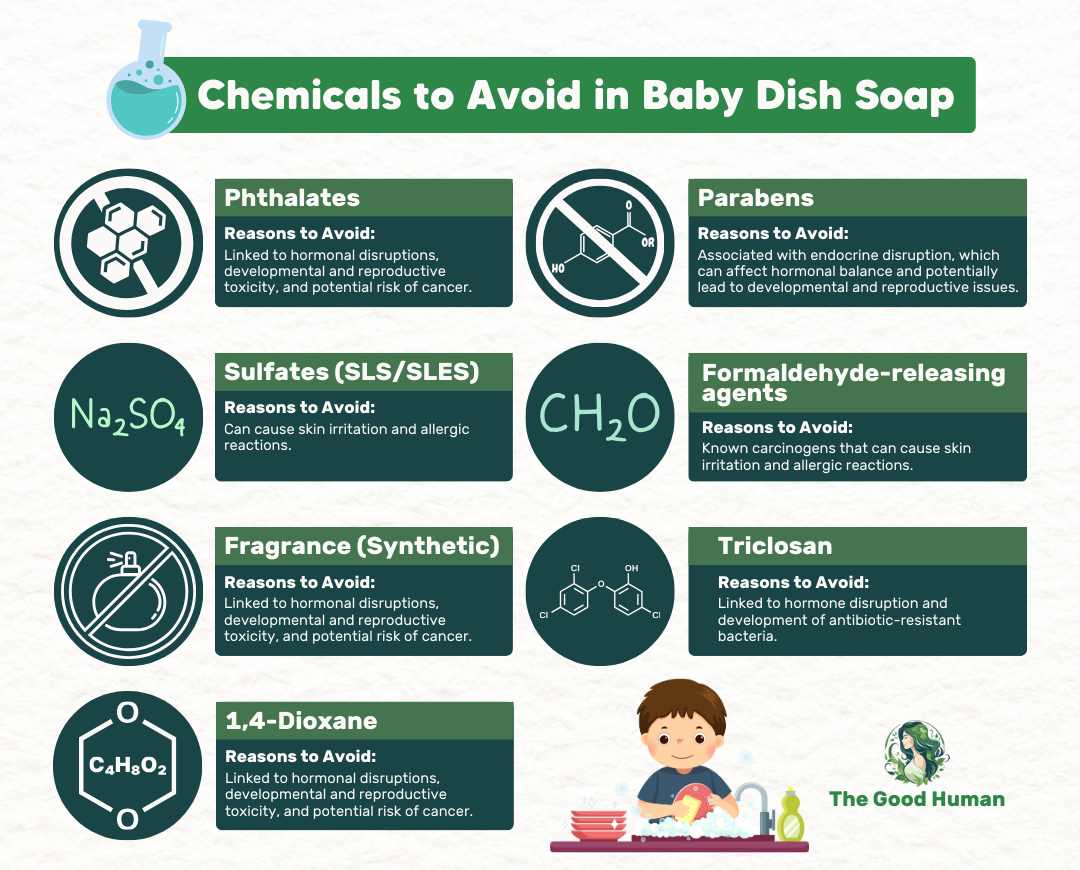
Parabens and Formaldehyde
Parabens are commonly used as preservatives in some dish soaps, while formaldehyde can be present as a byproduct of manufacturing. Both have been linked to potential health concerns, including endocrine disruption, which can affect hormone development in infants.
Chlorine
Some dish soaps are marketed as “disinfecting” because they contain chlorine. Although this might seem good, chlorine can create dangerous byproducts which can upset a baby’s stomach and cause breathing issues.
Residual Soap Film
Sometimes, regular dish soaps don’t fully rinse off, leaving a residue on bottles. This residue can alter the taste and smell of formula or breastmilk and may harbor bacteria if not properly removed.
Top Picks for Safe and Effective Baby Bottle Dish Soaps (Update for 2024)
Now that you know the importance of selecting the appropriate dish soap for your baby’s bottles, here are excellent options that are eco-friendly, safe, and effective.
1. Babyganics Foaming Dish And Bottle Soap
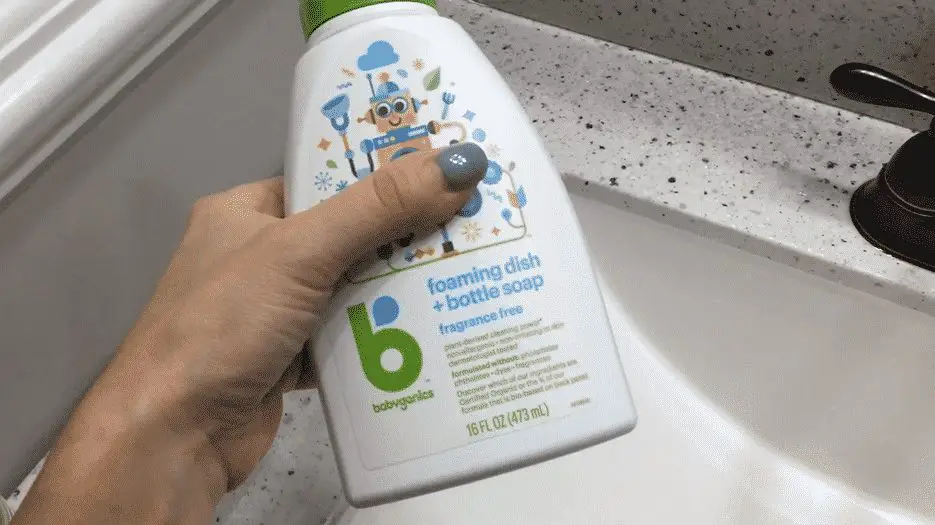
Babyganics Foaming Dish and Bottle Soap is highly recommended because of its formula and effectiveness. Its plant-derived ingredients are gentle on sensitive skin. The absence of dyes, fragrances, phosphates, and phthalates ensures safety for babies and their bottles, sippy cups, pacifiers.
Tests have shown that the product removes dried milk, residues, grease, and other messes. Its quick-rinse formula means a small amount of soap goes a long way when washing baby bottles.
The convenient pump dispenser also makes applying the product to a brush or sponge easy for a thorough cleaning and rinse.
Pros:
- Completely plant-based
- Fragrance-free
- Tested by dermatologists and pediatricians
- Leaves no residue
Cons:
- Some people dislike its foamy formula
2. Premium Natural Baby Bottle Liquid Dish Soap By Elysium Eco World
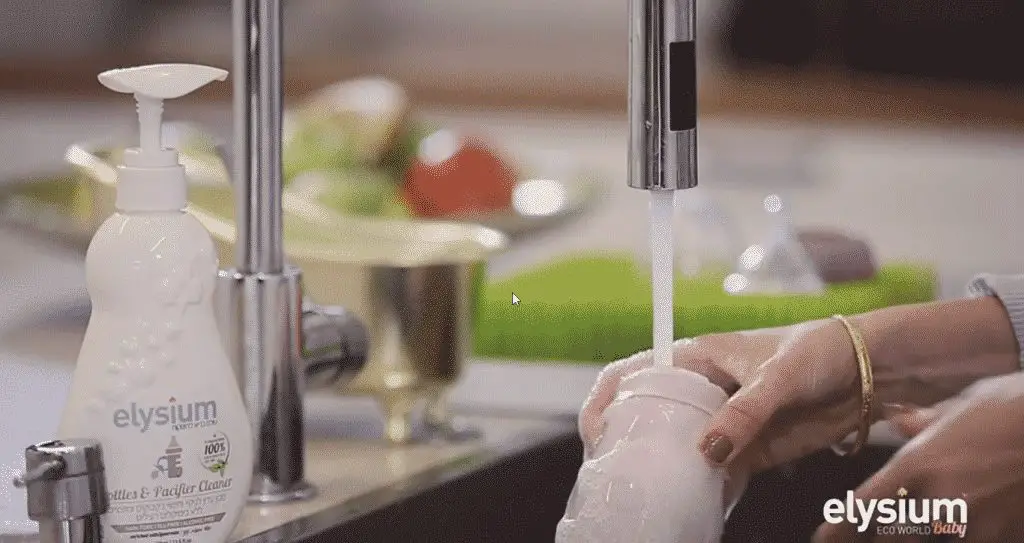
The Premium Natural Baby Bottle Soap by Elysium Eco World features natural herbal extracts. It has no phthalates, sulfates, parabens, or alcohol. This ecological product effectively removes dirt, milk residue, and leftover food even without harmful ingredients.
The packaging offers two convenient options for use. The squeezable bottle design is ideal for travelers concerned about leaks in their luggage. For frequent home use, the pump attachment provides easy dispensing when cleaning multiple cups and bottles.
Pros:
- Versatile packaging
- Fragrance-free
- Has an easy, clean formula
- Vegan and eco-friendly
- Alcohol-free
Cons:
- Has a light scent
3. Baby Bottle And Dish Soap By Dreft
Dreft Bottle & Dish Soap boasts a 90% plant-based formula, making it gentle on adult and baby skin. It’s also fragrance-free and dye-free.
The product works well not just for baby bottles but also for breast pump equipment. Its efficient cleaning prevents soapy residue, minimizing the need for rinsing. Just a little bit of Dreft Bottle & Dish Soap goes a long way, often making a single pump enough for thorough cleaning.
Pros:
- Fragrance-free
- Plant-based
- Pediatrician-recommended
- No dyes
- USDA-certified biobased product
Cons:
- Some users found the soap a bit thick
4. Dr. Bronner’s Pure-Castile Liquid Soap
Dr. Bronner’s is a household name in the country. It’s so good that several standard organizations, including the USDA, endorse it.
Dr. Bronner’s Pure-Castile Liquid Soap has no perfumes, dyes, or fragrances. It’s made with 70% certified fair trade and 90% organic ingredients, making it completely vegan and biodegradable.
This product avoids harsh chemicals and contains natural oils like coconut, jojoba, hemp seed, and palm kernel oil. It’s free from preservatives, thickeners, or foaming agents, offering a concentrated formula where a little goes a long way for excellent results.
What also sets this product apart is its versatility. It’s suitable for washing pets, mopping floors, and doing laundry.
Pros:
- Never tested on animals
- Non-GMO
- Great for sensitive skin
- Highly concentrated
Cons:
- Tends to roughen the skin
5. Medela Quick Clean Breast Milk Removal Soap
This Medela Quick Clean Breast Milk Removal Soap has a formula that can end your problems with breast milk residues and milk film. The product features a fast-acting formula that simplifies cleaning baby’s feeding accessories and other items, eliminating the need for scrubbing.
It’s fragrance-free, so it won’t interfere with your baby’s appetite or cause nasal irritation. Hypoallergenic and safe, it’s suitable for pacifiers and breast pumps, and can even be used for washing nursing clothes.
Pros:
- Has a quick, clean formula
- Fragrance-free
- Hypoallergenic
Cons:
- Leaves a film on the bottle when not rinsed properly
6. ATTITUDE Baby Dish Soap
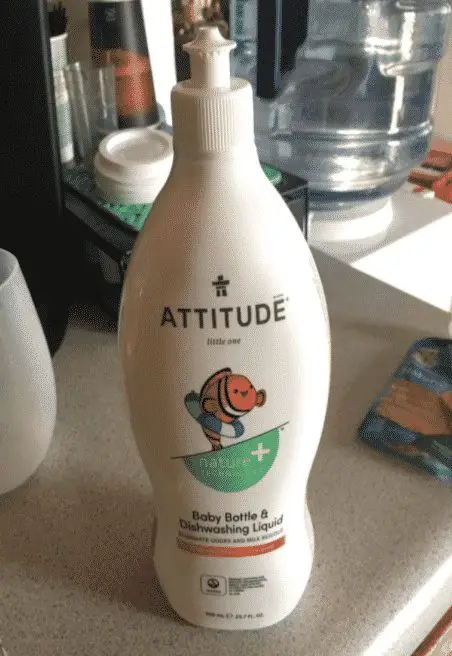
The ATTITUDE brand is known for its commitment to eco-friendly products. Their Baby Dish Soap holds the approval of the US Environmental Protection Agency and is 100% vegan-friendly and cruelty-free.
ATTITUDE Baby Dish Soap contains saponins, a type of plant glycosides that effectively combat milk residue, grease, and odors. The hypoallergenic formula is gentle on the skin, leaving it soft and clean after use.
Pros:
- Cruelty-free
- Eco-friendly
- Sulfate-free
- Vegan
Cons:
- It may not be effective when used for regular dishwashing
7. Better Life Dish Soap
Better Life Unscented Dish Soap has aloe and vitamin E. It leaves the skin soft and moisturized after each use.
With all-natural ingredients, the dish soap is considered non-toxic and biodegradable. And like the other products on this list, it doesn’t contain fragrances.
If you’re used to dish soaps that produce abundant lather, you may find its minimal foaming quite disappointing. However, a lack of lather doesn’t mean that it’s not effective.
Pros:
- Made from all-natural ingredients
- Biodegradable
- Doesn’t leave any unwanted scent on bottles
Cons:
- Doesn’t lather
- It may turn yellow if stored for a while
8. Mrs. Meyer’s Clean Day Dishwashing Liquid Dish Soap
Mrs. Meyer’s Clean Day soap is a product many moms are familiar with. With plant-derived ingredients, like aloe vera extract and essential oil, it cuts through grease effortlessly. It also has glycerin, which is good for your skin.
One downside of the product is its scent. If you’re sensitive to smell, avoiding the lemon scent is best.
Pros:
- No parabens
- Plant-based
- Cruelty-free
- No phthalates
Cons:
- Has fragrance
9. Aleva Naturals Hypoallergenic Bottle And Dish Wash Liquid
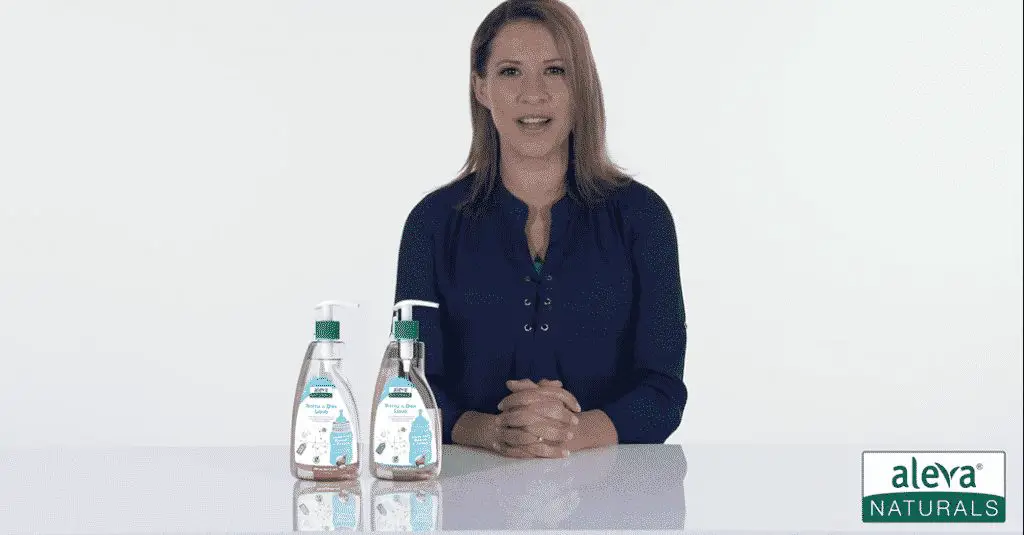
The Aleva Naturals Hypoallergenic Liquid Soap is cruelty-free, vegan, and plant-based. With organic aloe vera and coconut oil, it helps keep hands soft.
And if you find that it fails to live by its claims, there’s a 100% no-questions-asked satisfaction guarantee you can turn to. It simply shows how confident the company is with its product.
Pros:
- Gentle on skin
- Has a satisfaction guarantee
- Plant-based
Cons:
- Has a water lily scent that’s pretty light
10. Citrasolv Homesolv CitraDish Natural Dish Soap
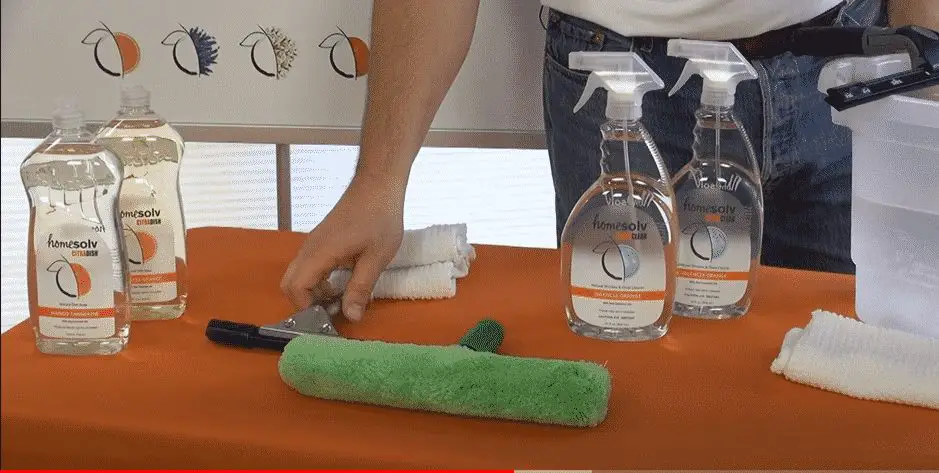
Citrasolv Homesolv CitraDish is extra tough when it comes to dishes. Formulated with genuine essential oils, it’s safe for septic systems too.
It is USDA-Certified, Leaping Bunny Certified, and vegan-friendly. Since it has no toxic or harmful ingredients, it can work as a soap for baby bottles.
Pros:
- Safe for septic systems
- Made with essential oils
Cons:
- Not enough bubbles for some user’s preference
Key Criteria for Choosing the Best Dish Soap for Baby Bottles
Choosing the right baby bottle dish soap can be challenging because there are so many options. Here are some key factors to keep in mind to ensure you select a soap that is safe and effective for your baby.
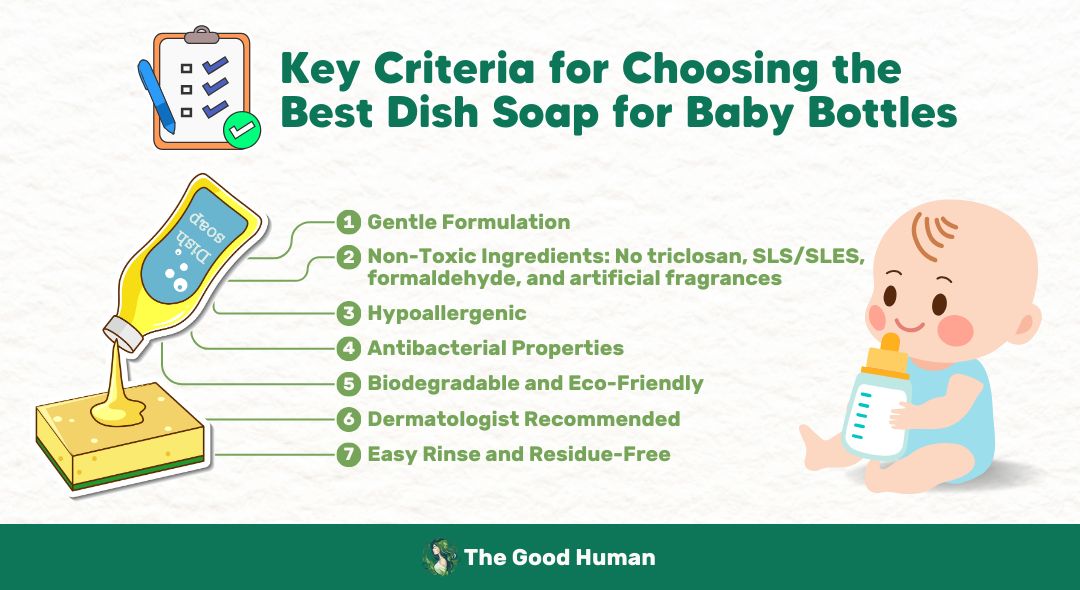
Ingredients to Avoid
Harsh Sulfates: Sodium Lauryl Sulfate (SLS) and Sodium Laureth Sulfate (SLES) are common ingredients in dish soaps that produce lather. However, they may irritate your baby’s sensitive skin and could disturb their digestive system if soap residue is ingested.
Parabens and Formaldehyde: Parabens are often used as preservatives, while formaldehyde can be a byproduct of manufacturing.
Artificial Fragrances: While they may smell pleasant, artificial fragrances can irritate your baby’s skin and respiratory system. Additionally, fragrance is often a catch-all term for many chemicals, some of which may be harmful.
Chlorine: Some dish soaps claim to have disinfecting qualities because they contain chlorine.
Natural and Safe Ingredients
Choosing a baby bottle dish soap formulated with natural, plant-derived ingredients is an excellent way to prioritize your baby’s health.
Look for ingredients like coconut oil, citrus extracts, or aloe vera – all gentle cleansing powerhouses. These natural alternatives effectively remove milk residue and grime without the harsh chemicals in conventional dish soaps.
Antibacterial Claims
While an antibacterial dish soap might seem appealing, it’s essential to understand that these products often contain harsh chemicals that can disrupt your baby’s developing microbiome.
The good news is that hot water and gentle soap are highly effective at killing bacteria in baby bottles. Additionally, some natural ingredients, like citrus extracts, possess antibacterial properties.
Efficacy Against Milk Residues
Look for soaps with good cleaning power derived from natural ingredients like plant-derived surfactants. Choosing a baby bottle soap that effectively removes milk residue is crucial to ensure a thorough cleaning.
Ease of Use and Packaging
As a busy parent, any small convenience can make a big difference. Consider features like user-friendly dispensing mechanisms (think pump dispensers) that allow for easy one-handed use.
Additionally, opt for packaging made from recycled materials, aligning your commitment to a safe and healthy environment for your baby with a sustainable choice.
How to Properly Clean Baby Bottles
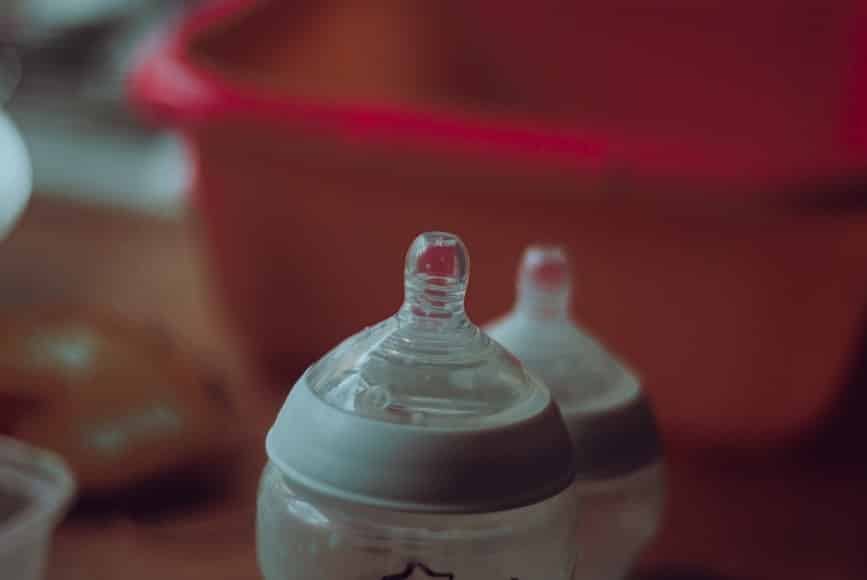
Now that you’ve chosen the perfect baby bottle soap, let’s explore the best practices for keeping those bottles sparkling clean and germ-free.
There are two main methods for cleaning baby bottles: hand washing and dishwashing.
Hand Washing
This method allows for a more thorough cleaning, especially for bottles with intricate parts like narrow necks or vents.
Here’s what you’ll need:
- Warm water
- Gentle baby bottle soap (chosen based on the criteria discussed earlier)
- Bottlebrush with a long handle (specifically designed for baby bottles)
- Small cleaning brush (for nipples and straws)
- Clean dish towel or drying rack
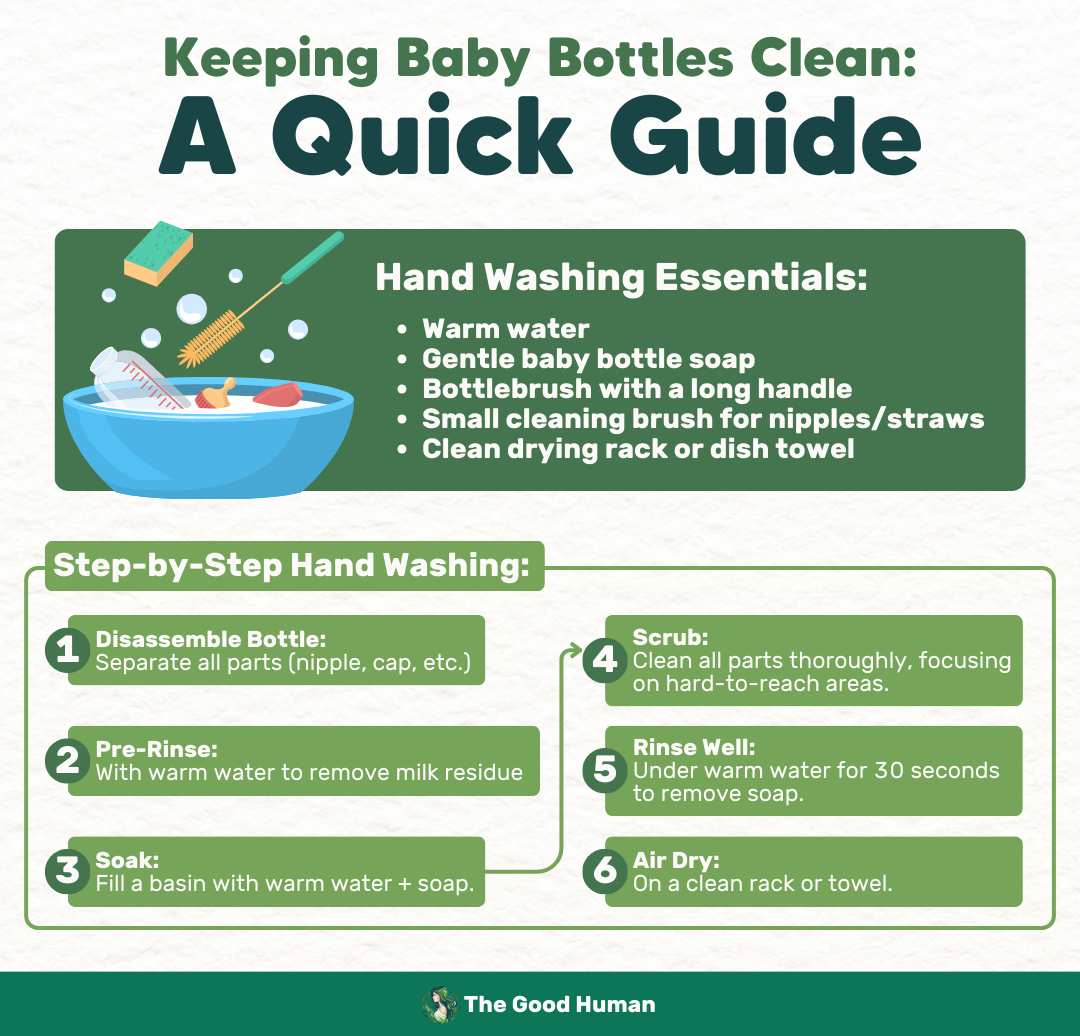
Step-by-Step Guide:
- Disassemble the Bottle: Take apart all the bottle components, including the nipple, screw ring, cap, and any venting system parts.
- Pre-Rinse: Rinse each bottle part with warm water to remove any leftover milk residue.
- Warm Water Bath: Fill a clean basin with warm water and add drops of your chosen baby bottle soap.
- Scrub, Scrub, Scrub: Using your bottle brush, thoroughly scrub all the interior and exterior surfaces of the bottle, paying particular attention to areas like the base and around the threads where the nipple screws on. Don’t forget to clean the nipple and straw with the smaller brush, reaching into all the nooks and crannies.
- Rinse, Rinse, Rinse: Rinse each bottle part thoroughly under warm running water for at least 30 seconds to remove all soap residue. Any leftover soap can irritate your baby’s delicate digestive system.
- Air Drying: Place the cleaned bottle parts on a clean dish towel or drying rack to air dry completely. Avoid using a traditional dish towel, as these can harbor bacteria.
Dishwashing (Top-Rack Only)
If you’re short on time, the dishwasher can be convenient. However, it’s important to note that hand washing is generally considered the more thorough method, especially for bottles with intricate parts.
Here’s how to use the dishwasher safely:
- Disassemble the Bottle: Remove all the bottle components.
- Top Rack Only: Place the bottle parts (excluding nipples and straws) on the top rack of your dishwasher. The high heat from the top rack helps sanitize the bottles. Avoid placing them on the bottom shelf where they could get blasted by harsh detergents.
- Hot Water Cycle: Choose a dishwasher cycle with hot water (at least 149°F or 65°C) for optimal cleaning and sanitization.
- Air Drying: Once the cycle is complete, remove the bottle parts and let them air dry on a clean dish towel or drying rack.
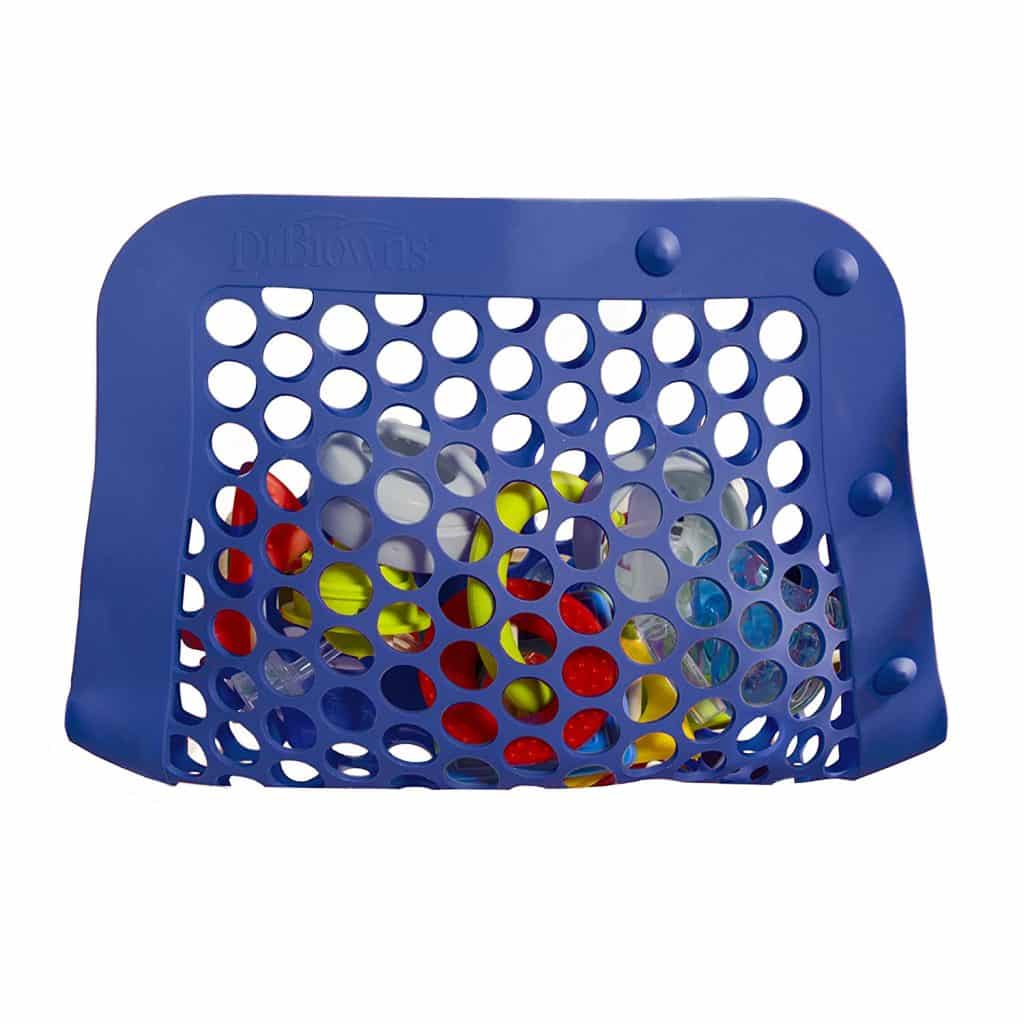
Tips for Efficient Cleaning
Designate a specific area in your kitchen for cleaning baby bottles. This will help keep everything organized and within easy reach. Stock your station with your chosen baby bottle soap, bottle brushes, and drying rack.
Invest in a set of bottle brushes specifically designed for baby bottles. These brushes typically have a long handle for reaching the bottom of bottles and angled bristles to clean all the nooks and crannies.
After your initial rinse with warm water, consider a quick final rinse with hot water (as hot as your hands can comfortably handle) to help kill any lingering bacteria.
Watch this brief video from Aptaclub to learn how to clean and sterilize baby bottles properly:
DIY Natural Dish Soap Recipes for Baby Bottles
Creating your natural dish soap for baby bottles can be a rewarding and cost-effective option for the eco-conscious parent who enjoys a bit of DIY.
While homemade cleaning solutions can be great, putting safety first is essential, especially when cleaning your baby’s bottles. Here are some key things to remember:
Skip the Essential Oils: While essential oils can have natural antibacterial properties, they can irritate a baby’s delicate skin. It’s best to avoid them altogether in dish soap for baby bottles.
Castile Soap is Key: Look for a gentle, unscented castile soap to use as a base for your DIY recipe. Castile soap is made from vegetable oils and is known for its gentle cleaning power.
Vinegar Power: White vinegar is a natural disinfectant and can be a great addition to your DIY dish soap recipe.
Simple DIY Dish Soap Recipe:
This recipe is gentle, effective, and perfect for cleaning baby bottles:
Ingredients:
- 1 cup grated castile soap
- 1 cup hot water
- 1/4 cup white vinegar
Instructions:
- In a heat-resistant bowl, grate the castile soap.
- Pour the hot water over the grated soap and stir until dissolved.
- Once the mixture cools slightly, stir in the white vinegar.
- Transfer the soap to a dispenser bottle (ideally recycled) and label it clearly.
Remember: DIY solutions can be a great option, but choosing recipes specifically formulated for baby bottles and prioritizing safety by avoiding harsh chemicals or essential oils is important.
You might be interested in exploring our selection of non-toxic play mats for kids.
Clean Bottles, Healthy Start: The Bottom Line
Finding the best baby bottle soaps can feel overwhelming. Still, with a few key considerations, you can confidently choose a product that prioritizes your baby’s health, cleaning efficacy, and the environment.
Avoid harsh chemicals like SLS, SLES, parabens, and artificial fragrances. Don’t be fooled by “gentle” formulas! Look for soaps that effectively remove milk residue and grime, ensuring a thorough cleaning for your baby’s bottles.
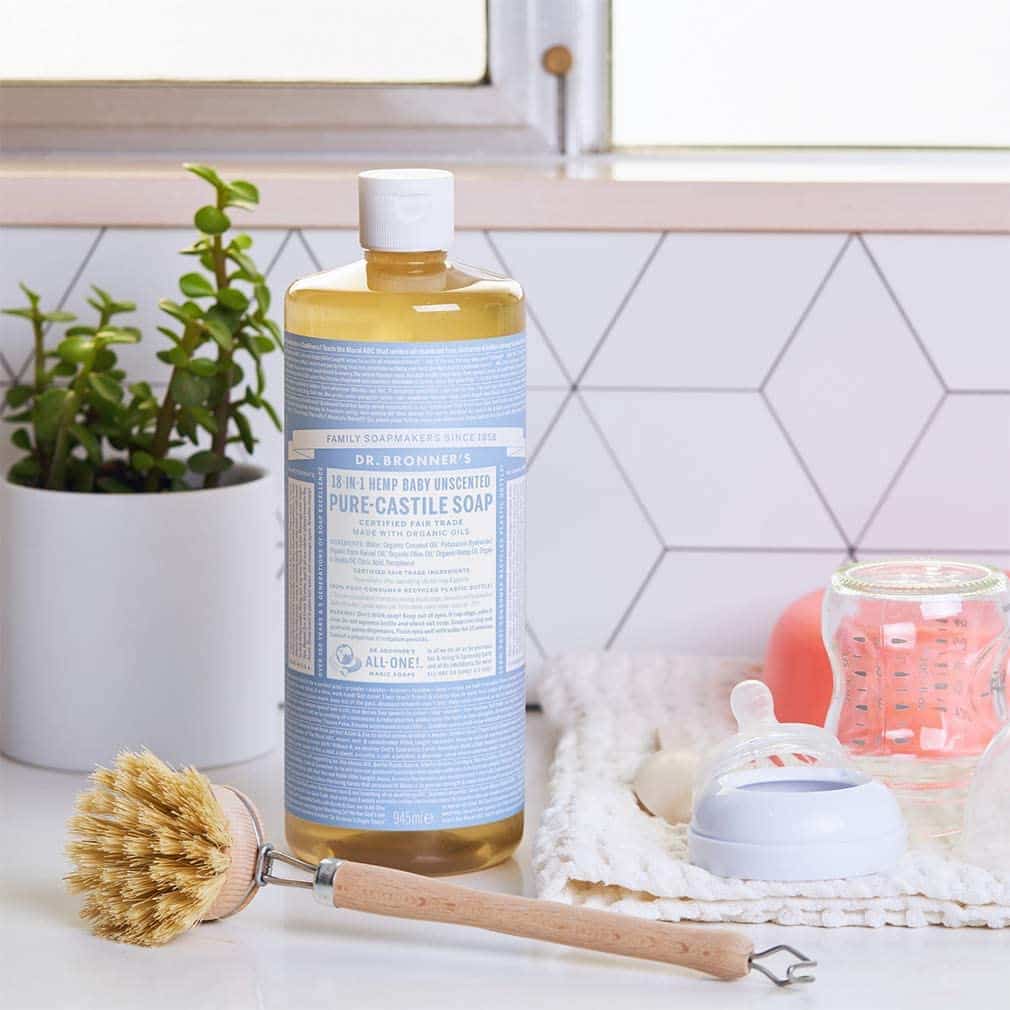
Frequently Asked Questions
Can I use regular dish soap for baby bottles?
It’s generally not recommended to use regular dish soap for baby bottles. While it might seem convenient, many conventional dish soaps contain harsh chemicals like SLS, SLES, parabens, and artificial fragrances. These chemicals can irritate your baby’s delicate skin and potentially disrupt their digestive system if ingested through residual soap left on bottles.
Should I use antibacterial soap for baby bottles?
While antibacterial soaps are appealing, it’s essential to understand that these products often contain harsh chemicals that can disrupt your baby’s developing microbiome. Hot water and a gentle soap are highly effective at killing bacteria on baby bottles.
Can you wash baby bottles without soap?
Technically, you could rinse baby bottles with hot water only. However, it’s usually not enough to remove all milk residue and grime, which can harbor bacteria. A gentle, plant-based dish soap formulated for baby bottles ensures a thorough and safe cleaning for your little one’s feeding essentials.
How often should I wash baby bottles?
According to the American Academy of Pediatrics and the CDC, you should wash baby bottles right after each feeding. If you can’t do that right away, you can rinse them out to prevent caked-on residue.
Do I need to sterilize the bottles after washing them with dish soap?
It’s not necessary to sterilize baby bottles after each use, but it’s a good idea to do it at least once a week. If you want peace of mind, you can sterilize after every use if you wish.

